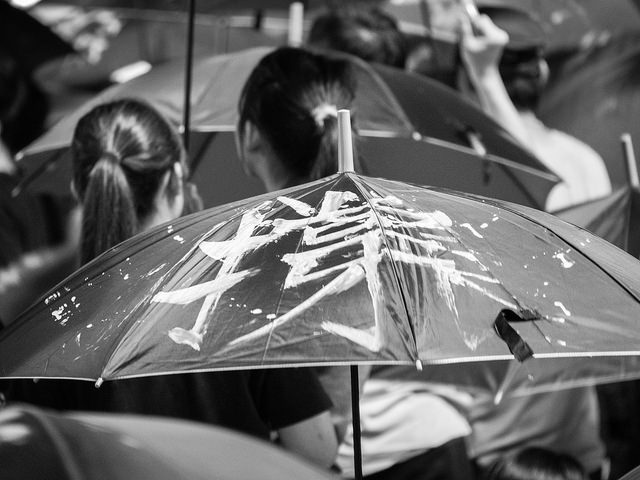China’s rise is not making the world more authoritarian, at least not for now
The rise of China has become one of the contemporary mainstays of geopolitical debate, with implications for the United States, Europe, Africa and perhaps most of all the rest of Asia. But what of its impact for democracy? Does the existence of an economically successful non-democratic player mean that other countries are seeking to replicate their model? Julie Bader argues that for now at least, that is not the case.

Credit: Willy AuYeung, CC BY SA 2.0
China has emerged as one of the most important international actors of our times. It is now the world’s largest trading nation, the second largest oil consumer after the United States, and it has become a non-negligible source of aid and foreign investment. Some fear that amongst the many implications this may have for the rest of the world, the rise of China will make the world less democratic.
Unlike the European Union’s and the United States’ explicit agenda of regime change and democracy promotion, few authoritarian regimes would normatively subscribe to the promotion of authoritarianism elsewhere. Nevertheless, examples abound of autocratsgiving each other a helping hand. But China’s role is ambiguous: On the one hand, China’s patronage of the most awkward dictatorships of our time comes to mind, North Korea and Myanmar until 2011; on the other,the Chinese Communist Party rejects any interventionist ambitions and frequently refers to the principle of noninterference.
China’s leader fear democratic upheavals inside of China and along its borders
China is a vital source of energy and the biggest trading partner for the internationally isolated regime in North Korea, and in 2007 it casted its first non-Taiwan related veto in the UN Security Council since 1973 to stop a resolution against human rights violations in Myanmar. But for all the support and protection these regimes have received, the Chinese government is worrying as much about their domestic mismanagement as about any “rough” behavior towards the international community. Both could provoke external intervention which would, from the Chinese perspective, amount to an American “encirclement”. Therefore, the Chinese protection of these regimes against pressure from outside is better understood as a matter of security rather than specific love for the generals and in both cases it was paired with the hope to stimulate reforms so as to increase their responsiveness to domestic grievances.
Whether with American involvement or not, democratic uprisings are worrisome for Chinese leaders as they could spill over and inspire similar anti-government protests at home. For example, the color revolutions in the former Soviet republics in the early 2000s triggered the Chinese to restrict NGOs operating in China and led to the bolstering of the Shanghai Cooperation Organisation to a bulwark against anti-regime activity in Central Asia. Even the much more distant Arab Spring in Northern Africa provoked fears of a domino effect in China, so Chinese security forces preventively cracked down on domestic democracy activists.
Non-interference legitimizes and reinforces non-democratic practices
Yet beyond shielding itself from pressure to democratise, China’s leadership appears to have little interest in a specific form of governance elsewhere and even principally opposes meddling in the internal affairs of others. The principle of noninterference, a long-standing guideline in China’s foreign policy, puts a premium on state sovereignty and rejects any kind of unconsented external intervention into another state’s domestic affairs.
Simply speaking, the noninterference principle prescribes turning a blind eye to a state’s domestic affairs and engaging any government – regardless of regime type or conduct. At times noninterference directly legitimized, if not enhanced, repressive and anti-democratic behavior. For instance, when Chinese leaders welcomed with a 21-gun salute Uzbekistan’s president Karminov just after the Andijan massacre in 2005 or when just after the disputed 2008 elections a container ship full of arms was sent to Zimbabwe tacitly approving that President Mugabe would use these weapons to silence domestic protest.
More generally, the principle justifies China’s rejection of aid conditionality on good-governance which OECD donors find increasingly important. And it motivates China’s objections against international sanctions as a matter of principle. While China using its veto power in the UN Security Council as in the case of Myanmar is rather exceptional, China was often successful in watering-down UN resolutions or preventing them from being tabled in the first place. In some cases, this has encouraged internationally isolated regimes, such as in Iran, to seek protection against international intervention by seeking Chinese investments and so binding Chinese interest to the regime.
The crux with noninterference is that while claiming not to affect the domestic context elsewhere, it is likely to result in just that. This is because domestic politics and foreign affairs are intimately linked. Governments as well as their opponents frequently use interaction with the outside world to appeal to domestic constituencies, for example when they claim credit for foreign investment or aid. Noninterference per definition implies to focus all interaction on the incumbent government which represents a sovereign state. But only with a level playingfield at home, such selective engagement by the Chinese does not disproportionately advantage incumbents such as Mugabe or Karminov over their competitors.
Trade relations with China prolong authoritarian rule, but on the whole, China’s influence is overstated
Because China’s noninterference policy is so clearly skewed towards incumbents, we should be able to observe this at the level of individual governments if China’s rise indeed leads to more authoritarianism in the world. In a recent article, I investigated how several forms of bilateral interaction with China – state visits, trade dependence, arms trade, and two proxies for Chinese development cooperation and investments –may strengthen an incumbent leader’s position in power.
My results are mixed. On the one hand, intense trade relations with China significantly prolong authoritarian rule in China’s trade partners. Authoritarian leaders and regimes remain longer in power when China is an important export destination, i.e. exports to China as share of total exports are relatively high. Interestingly, this effect cannot simply be attributed to oil-producing countries. Neither is it exclusively driven by African countries some of which are highly export-dependent on China.
On the other hand, however, my analysis suggests that China’s influence is rather overstated, at least for the period directly after the end of the Cold War until the end of 2008, which I investigated. Neither bilateral high-level diplomatic visits, nor the transfer of arms, nor any other forms of bilateral interaction with China significantly bolster the power of authoritarian leaders or regimes. This is not to dismiss the possibility that interaction with China has been vital for individual governments, but in statistical terms we cannot observe that it systematically advantages and prolongs the tenure of incumbents.
Leaders in democracies do not profit from interaction with China either: none of the different types of interactions with China is associated with prolonged power for democratic leaders. This latter finding intuitively makes sense, because institutional constraints tend to be strong in democracies. Leaders in democracies are restricted in how they use resources and re-invest external assistance domestically and they are often limited in their terms in office.
China is discovering the limits of noninterference, the West should stop demonizing the rise of China
So, despite China’s questionable engagement with some of the world’s worst despots, accounts that attribute authoritarian persistence in the world to the rise of China seem to be overblown. Meanwhile, China’s foreign policy-makers are going through an intense learning phase as the Darfur crisis as well as anti-Chinese backlashes in various African and Asian countries exposed the limits of a strict noninterference policy. Most importantly, perhaps, Chinese leaders now recognize that even if mismanagement and domestic conflict elsewhere can be ignored in the short run, it is likely to threaten returns to economic investments in the long-term.
While China is incrementally stretching the interpretation of noninterference, Western media should stop demonising the rise of China. The world is too complex to draw a black-and-white good-democracies versus bad-autocracies picture. Looking closely enough beyond well-intended democracy promotion, one can find many instances in which Western democracies’ foreign relations, including those with non-democracies, do not look so much different from those of China.
—
Note: this post represents the views of the author and not those of Democratic Audit UK or the LSE. Please read our comments policy before posting.
—
 Julia Bader is Assistant Professor of International Relations at the University of Amsterdam. Her academic profile can be found here.
Julia Bader is Assistant Professor of International Relations at the University of Amsterdam. Her academic profile can be found here.





 Democratic Audit's core funding is provided by the Joseph Rowntree Charitable Trust. Additional funding is provided by the London School of Economics.
Democratic Audit's core funding is provided by the Joseph Rowntree Charitable Trust. Additional funding is provided by the London School of Economics.
Is China’s rise promoting global authoritarianism? https://t.co/J7qGkFB4Go
China’s rise not making world more authoritarian https://t.co/s7AMcNl3ZL
no surprise-unlike #US, #China does not export ideology since Mao
#China’s impact (or not) on whether countries are more/less democratic. Nuanced take by J. Bader @democraticaudit https://t.co/VxxhB77ZDm
China’s rise is not making the world more authoritarian, at least not for now, writes Julia Bader https://t.co/XghsBTShfN
China’s rise is not making the world more authoritarian, at least not for now, yet https://t.co/D3FlHt786v
China’s rise is not making the world more authoritarian, at least not for now https://t.co/4Hphb0uOZA https://t.co/MXncv1DLRi